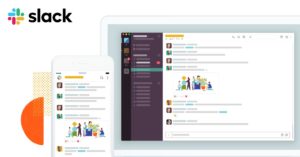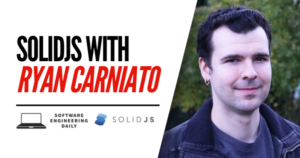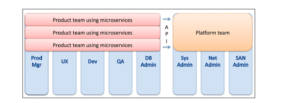freeCodeCamp’s Quincy Larson interviews Jeff Meyerson
Podcast: Play in new window | Download
Subscribe: RSS


We are republishing a podcast from the freeCodeCamp Podcast as a weekend episode.
Jeff Meyerson is the creator and host of the Software Engineering Daily podcast.
Jeff grew up in Texas. He spent most of his childhood playing competitive strategy games like Magic: the Gathering. This lead him to making a lot of money – and losing a lot of money – during the Golden Age of Poker of the early 2000’s.
Poker distracted Jeff from his academics, but he was able to transfer into University of Texas at Austin after attending another school for a year. There he studied computer science and did internships at companies like eBay.
Jeff struggled with software engineering as a career. His first job was in Chicago at a finance company. He says of the experience:
“The way that trading companies work is very different than Silicon Valley style product companies. It’s kind of a petri dish. There’s so much money at stake that the people they bring in are amazing engineers, but they’re just like cut from a very different cloth.
“I remember this day when I opened up Hacker News and I saw a bunch of cool things people had been building, and then I tabbed over to the unit tests I was writing for the options trading system. And it just sounded cooler to be building stuff. And I became disillusioned pretty quickly.”
Next, Jeff moved to Seattle to work in advertisement technology. Ad-tech wasn’t the field for him, but he did learn a lot about how advertising works. And that would prove instrumental later when he created Software Engineering Daily as an ad-supported podcast.
Before he got to that point, though, Jeff decided to apply for an engineering job at Amazon. He says of his time at Amazon:
“Amazon was like a museum to me. It was a place where I wanted to observe. I wanted to see the things that were on offer at the museum. But I quickly discovered that I did not want to work there.”
Jeff says his time at Amazon just happened to coincide with his growing interest in entrepreneurism. He says:
“I was talking with a coworker and I was saying to him ‘Hey man, did you see the new AWS service? It’s really cool. Imagine all the money you could make if you did like this business with this AWS service together with this other API, and then you’ve got Stripe, and then you could just make your own business. Wouldn’t that be cool?’ And he was like ‘Hey man, I’ve got to go work on my own service’ doing some kind of very subtle element of the infrastructure.
“And thank God we have people like that where that’s what they want to be doing. Those people are putting together the systems that allow you to get same-day delivery. That’s awesome. I like same-day delivery. But I don’t want to be the one that builds the back end infrastructure to keep that thing running.”
While he was in Seattle, Jeff became a heavy listener to technology podcasts.
“This is one thing I realized is so magical about podcasting. Because the consumption format is such passive communication between people, it keeps you company a weird “Her” kind of way. Instead of this voice assistant I have this cadre of characters that I listen to in podcast form.”
These podcasts gave Jeff a glimpse into how developers actually built software in different fields.
“It was shocking to me how different podcast conversations about applied computer science were from conversations that would take place in the ivory tower. And that disconnect has stuck with me for a long time.”
Around this time, Robert Blumen, who runs the Software Engineering Radio podcast, put out a call for volunteer hosts.
Jeff said he wrote to Blumen saying:
“I’m just a terrible software engineer. I’ll do whatever you tell me. Just let me interview people.
“I did the first 5 interviews and he let me stay on, and I kept getting slightly better. I just never stopped doing it.”
Jeff later got Blumen’s blessing for creating the Software Engineering Daily podcast. His goal was to take the Software Engineering Radio format daily, and with a consistent host each each time.
Before Jeff launched his podcast, he calculated that he only had 4 months worth of living expenses left in his savings. But he was able to go out and find advertisers, and get the podcast to break-even within just 2 months. And the podcast has been profitable ever since.
I’ve known Jeff for about 5 years, and he and I had a lot of other topics to talk about.
For example, we talk about the right size of an organization. Software Engineering Daily, for example, is just two people – Jeff and Erika. And they’re able to publish 1-hour episodes each week.
We also talk about Jeff’s other entrepreneurial efforts – including FindCollabs – and how he’s managed to fund them Software Engineering Daily.
This interview is a 2 hour listen in your favorite podcast player app – just search for “freecodecamp” and you should find it.
If you have an Amazon Echo, you can just say “Alexa – play the freeCodeCamp podcast.”
Or you can listen to it right here in your browser.
And you can follow Jeff on Twitter here.



















